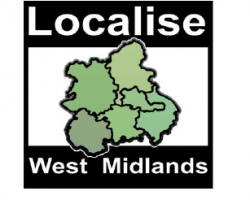Karen Leach, from Localise West Midlands, argues the case for a Birmingham Pound
It’s been fantastic to see all the interest in the potential of a Birmingham Pound over the last few days. Just one tweet following a very first-stage meeting of a few potentially interested people, and the Birmingham Mail were covering the story. I don’t want to belittle my abilities to attract conventional media to the Localising Prosperity agenda, but we’re hardly used to being sought out like that! Thanks Tom Davis – your professional interest is much appreciated.
For those who don’t know: the current new rash of local currencies are worth a look. In our meeting we heard from Steve Clarke of the Bristol Pound. They are taking off in Bristol, Brixton and Totnes particularly – though lots of other places are following, like Birmingham. The local pounds are exchangeable with sterling: for every Bristol Pound in circulation there’s a sterling one in the credit union’s account. Local currencies can be used with locally-owned businesses. Businesses can trade with other local businesses. Bristol council accepts council tax and business rates in Bristol Pounds, and council employees can accept part of their wages in them. There are locally-designed paper notes, which are great for spreading awareness of the scheme, but most transactions are electronic with a handy mobile-to-mobile payment system. This means for example that market traders are enabled to take electronic payments.
You can buy bathrooms, get bikes repaired, have plumbing carried out, as well as buy all the local produce you would expect to be able to buy. Yes, it needs funds to run the scheme, but the returns look healthy, if hard to measure: Bristol Council thinks it’s worth around £100,000 per year in tourism benefits alone. It also raises the profile of local money circulation as an idea: far more people are becoming aware that they can choose to spend their money in a way that supports livelihoods.
One thing I’m going to bang on about constantly as we progress these plans is that we must make this an inclusive local currency: Birmingham is good at ‘superdiversity’ and if this local currency happens we want it to be something everyone in the city feels is theirs to use, in whatever shopping culture they find themselves. I live just off Ladypool Road and would love to see all those great indie grocers taking Birmingham Pounds, and paying their suppliers at the Birmingham Wholesale Markets with them… The credit union also plays a role: electronic transactions happen via accounts with the local credit union, which gives them new members, new capital and higher public profile.
Not that I think any of the new currencies are as ‘exclusive’ as some critics think they are. It’s not the disposable income brigade shopping in trendy independents that have brought about the massive global rise in inequality and environmental injustice, is it? It’s the corporate shareholder model, sucking out the value from the real economy that gives us our livelihoods.
And to despise the ‘trendy independents’ aspect of local currencies because of their exclusivity, overlooks how local money flows can work. Surely when some have more disposable income than others, we want that income to be going to the ‘livelihoods economy’ not the ‘parasitic economy’? Spending money at Glynn Purnell’s restaurant sends it into the Birmingham wholesale markets, whose vital role in providing jobs and affordable fresh food is well documented: better than some big chain providing a fraction of the local livelihood value. Trickle down is a myth – until you decentralise money flows.
No scale of economy automatically generates equality and inclusion, but tackling the concentration of wealth in so few hands has to be pretty crucial.
So we’re meeting again in a couple of weeks to start to make some plans – for fundraising, promotion, getting signup, organisational models, banknote design competitions, partners to involve. People involved so far are from a credit union, the new Impact Hub, the council, Birmingham Friends of the Earth, Kings Heath Transition, Equality West Midlands, academics and business organisations. There’s a good buzz about it. Watch this space.
This blog was originally published on the Localise West Midlands website

